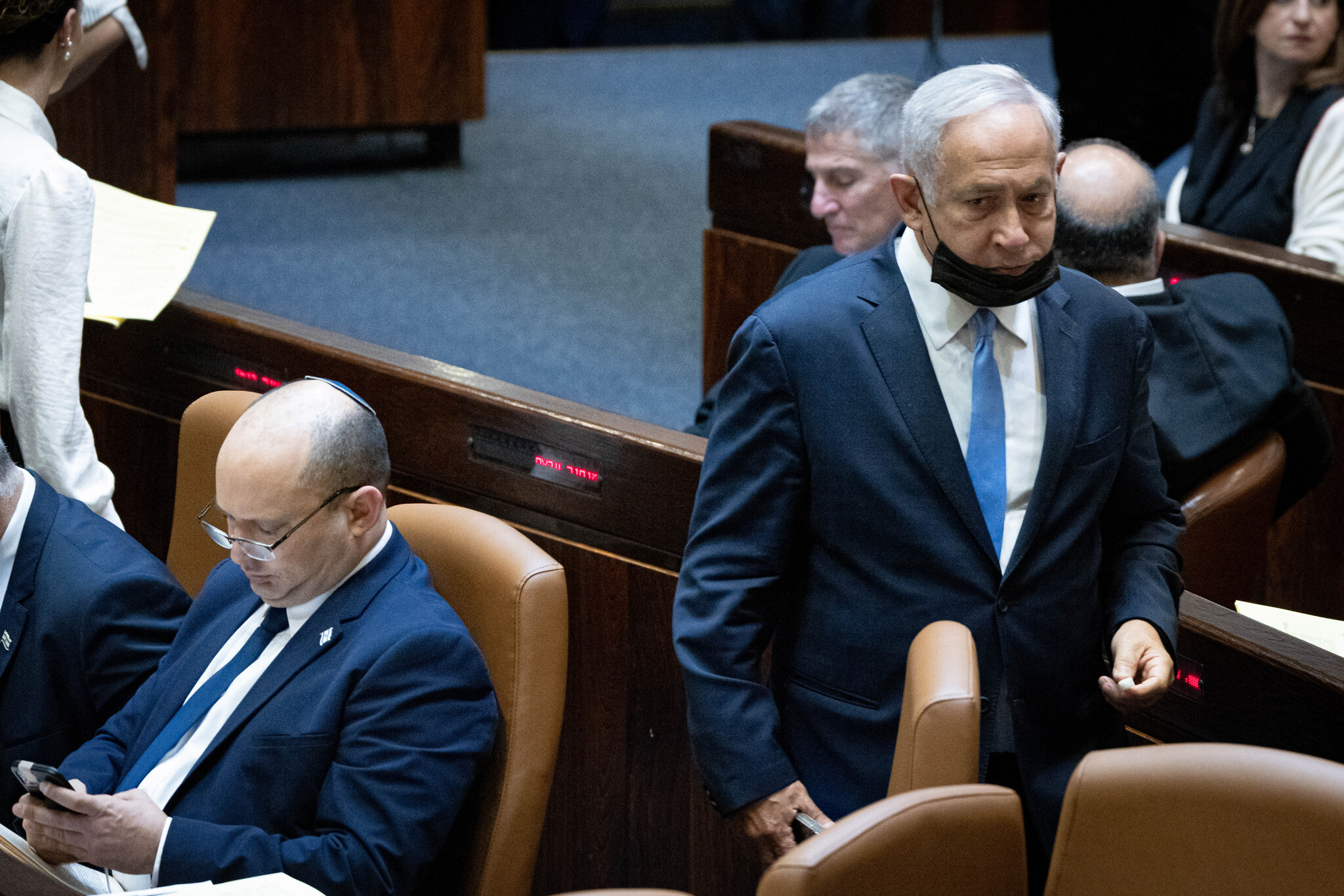Lawmakers approve legislation with vote of 59-56, further shoring up government’s stability, a day after approval of 2021 budget averted threat of early elections

The Knesset early on Friday passed Israel’s 2022 budget, clearing its last immediate legislative hurdle and capping a major success for Prime Minister Naftali Bennett’s unlikely ruling alliance of eight ideological disparate parties.
The final vote came after a marathon voting session that saw lawmakers pass Israel’s 2021 budget early on Thursday, averting the prospect of immediate early elections, as the ruling coalition overcame its differences and opposition objections.
The passage of the legislation helps shore up the government’s stability after years of political crises that saw the Knesset fail to pass a national budget for over three years, and proves Bennett’s unwieldy coalition can come together on major issues.
The coalition gave final approval to the NIS 573 billion ($183 billion) state budget for 2022, far ahead of its March 2022 deadline, as the legislation passed its third reading shortly after 3 a.m. on Friday. The 2022 budget passed with a vote of 59 in favor and 56 against in the 120-seat Knesset. It was not immediately clear which lawmakers sat out the final vote.
The 2021 budget voted through on Thursday was far more urgent for the coalition, since a failure to pass it by its November 14 deadline would have meant the automatic dissolution of parliament. The 61-59 vote saw lawmakers vote along coalition-opposition lines just after 5 a.m. Friday, following an all-night session.
Some 600 separate parliamentary votes were required to pass the two spending plans.
The NIS 609 billion ($194 billion) spending plan for 2021 was the first budget Israel has passed since 2018, due to a prolonged political deadlock that saw successive governments fall before they could bring a proposal to the Knesset.
On Thursday afternoon the Knesset approved the Economic Arrangements Bill in its final readings earlier than expected after the opposition withdrew most of its objections. The Arrangements Law — which determines how funds will be disbursed— is usually the final precursor for passing the budget.
“Tonight, we got Israel back on track,” Bennett said on Twitter shortly after the budget passed on Friday.

The legislative victories also moved Foreign Minister Yair Lapid closer to entering the prime minister’s seat in August 2023 as per his power-sharing deal with Bennett.
The coalition’s success was also seen as a rebuke of former prime minister Benjamin Netanyahu, who was unable to pass a new budget since 2018 amid a series of political deadlocks and had predicted that the coalition would be unable to effectively run the country given the competing ideologies at play.
The opposition fought the budget until the bitter end, with its members protesting that the vote was nearing Shabbat and Friday prayers for Muslims shortly before it passed. Opposition lawmakers exited the plenum immediately after voting against the bill, avoiding the announcement that it had passed.
“I regret that the opposition did not respect this occasion,” said Knesset Speaker Mickey Levy. “This was a completely democratic process by an elected government.”
Despite having only a single seat edge over the opposition, the coalition managed to win nearly all of the hundreds of votes held between late Wednesday and early Friday.
The diverse composition of the government led by Bennett — made up of right-wing, centrist and left-wing parties plus an Islamist faction — had, however, complicated the effort to pass a budget, with the opposition of a single lawmaker theoretically able to bring down the wafer-thin coalition.
The final vote on the 2022 budget was pushed back by several hours late on Thursday after a coalition member accidentally voted against one of the budget’s hundreds of clauses. Labor MK Emilie Moatti mistakenly pressed the wrong button on a vote to approve funds for building classrooms, leading to a 59-59 tie and the measure’s defeat.
Moatti said she was sorry for the error, blaming it on “only getting two hours of sleep” after the all-night session. She also apologized by handing out flowers to fellow coalition Knesset members.
The measure was the first of hundreds of votes relating to the budget that did not pass despite the coalition having only a single vote edge over the opposition.

Netanyahu, who now heads the opposition, accidentally voted with the coalition several times during the marathon sessions, and party leaders had expressed worries over fatigue and mistakes bogging down the process, which kicked off Tuesday with lengthy speeches, followed by a seemingly endless stream of votes held since Wednesday afternoon.
“It happens that you get confused while voting. Ask anyone who voted for Bennnett,” Netanyahu said on Twitter.
While failure to pass the 2021 bill could have seen the government collapse, passage of the economic plan is expected to stabilize the coalition for the near future at least, amid attempts by the opposition to drive wedges between the coalition’s various ideologies.
Netanyahu is widely believed to have torpedoed the most recent budget, under his power-sharing government with Benny Gantz, in order to bring down that coalition and avoid passing the premiership on to him as had been agreed between the two as part of their deal.
That fight led directly to the collapse of the last government and the most recent election, the results of which saw Netanyahu ousted from office in June.
As reported by The Times of Israel
